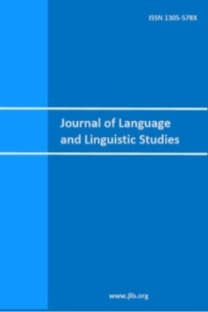Intertextuality in Albert Camus’s philosophy: “let us imagine Sisyphus happy”
Öz
Please fill up the following information accurately. (Please
use Times New Roman, 12 pt.Intertextuality in Albert Camus’s philosophy: “let us imagine Sisyphus happy”
Intertextuality, the term defining the relationship and the similarity of a newly-produced text with previous ones, has provided a broad array of subjects to be studied especially in social sciences. Firstly, literary works have been analyzed within the framework of intertextuality, and striking similarities have been found among literary texts. Nevertheless, the world cannot be limited to the literature since there are numerous ways and possibilities for human beings to express themselves. Philosophy, for instance, is the deepest version of humans’ self-expressions and understandings; therefore, it has been inevitably influenced by external sources such as myths, literature, politics, economics or society. Although the intertextuality in philosophy has been mostly analyzed through the written philosophical works, there is a more basic and evident relationship in philosophers’ perspectives: the intertextuality in the philosophy itself. Accordingly, this study aims to illustrate the role of the intertextual references in the formation of philosophical approaches. For this purpose, the study will focus on Albert Camus’s “absurd” philosophy, and the intertextual relationship between Camus’s philosophy and the myth of Sisyphus will be examined from a comparative perspective. By this way, it is aimed to demonstrate how our happiness is dependent on our desire to “imagine Sisyphus happy”.
Information about Author(s)*
Author 1
Author
(Last name, First name)
Taşdan, Tuğçe Elif
Affiliated
institution (University)
Ondokuz Mayıs UniversityCountry
TurkeyEmail
address
elif.tasdan@hotmail.fr
Department
& Rank
Department of Translation and InterpretingCorresponding author (Yes/No)
Write only one corresponding author.
Yes
Author 2
Author
(Last name, First name)
Affiliated
institution (University)
Country
Email
address
Department
& Rank
Corresponding
author (Yes/No)
Author 3
Author
(Last name, First name)
Affiliated
institution (University)
Country
Email
address
Department
& Rank
Corresponding
author (Yes/No)
Author 4
Author
(Last name, First name)
Affiliated
institution (University)
Country
Email
address
Department
& Rank
Corresponding
author (Yes/No)
Anahtar Kelimeler:
Intertextuality; philosophy; Albert Camus; absurdity; Sisyphus
___
Albert Camus – Biographical. (n.d.). In Nobelprize.org. Retrieved on August 14, 2017 from http://www.nobelprize.org/nobel_prizes/literature/laureates/1957/camus-bio.html.Albert Camus Biography (2014). In Biography.com. Retrieved on August 14, 2017 from https://www.biography.com/people/albert-camus-9236690.
Allen, G. (2000). Intertextuality. London: Routledge.
Bakhtin, M. M. (1981). The dialogic imagination: four essays. (C. Emerson & M. Holquist, Trans.). Austin: University of Texas Press.
Bakhtin, M. M. (1986). Speech genres and other late essays (V. W. McGee, Trans). Austin: University of Texas Press.
Bauman, R. (2004). A World of Others’ Words. Oxford: Blackwell Publishing.
Camus, A. (1955). The Myth of Sisyphus and Other Essays. (J O’Brien, Trans.). New York: Knopf.
Caraway, J. E. (1992). Albert Camus and the Ethics of Rebellion. Mediterranean Studies, 3, 125-136.
Gordon, M. (2016). Teachers as Absurd Heroes: Camus’ Sisyphus and the Promise of Rebellion. Educational Theory and Philosophy, 48(6), 589-604.
Kristeva, J. (1989). The Kristeva Reader. (T. Moi, Ed.). Oxford: Basil Blackwell.
Miola, R. S. (2004). Seven Types of Intertextuality. In M. Marrapodi (Ed.), Shakespeare, Italy and Intertextuality, (pp. 13-25). Manchester: Manchester University Press.
Sisyphus. (n.d.). In Greekmythology.com. Retrieved on August 14, 2017 from https://www.greekmythology.com/Myths/Mortals/Sisyphus/sisyphus.html.
The Myth of Sisyphus (2017). In Greek Myths and Mythology. Retrieved on August 14, 2017 from https://www.greekmyths-greekmythology.com/the-myth-of-sisyphus/.
Verhoef, A. H. (2014). Sisyphus, Happiness and Transcendence. South African Journal of Philosophy, 33(4), 537-546.
Ward, J. J. (2012). Following in the Footsteps of Sisyphus: Camus Vonnegut, and Rational Emotive Behavior Therapy. Interdisciplinary Literary Studies, 14(1), 79-94.
- ISSN: 1305-578X
- Yayın Aralığı: Yılda 4 Sayı
- Yayıncı: Hacettepe Üniversitesi
Sayıdaki Diğer Makaleler
Perceptions of postgraduate students on academic writing skills: A metaphor analysis study
Language assessment through Bloom’s Taxonomy
Dinçay KÖKSAL, Ömer Gökhan ULUM
Sabahattin YEŞİLÇINAR, Abdülvahit ÇAKIR
Conceptualization of theory in English language teaching by student teachers and practicing teachers
Fatma GÜMÜŞOK, Ayşegül DALOĞLU
Seher BALBAY, İlknur PAMUK, Tuğçe TEMİR, Cemile DOĞAN
An analysis of native and foreign language competence of Turkish young learners
The effects of teaching practicum on EFL pre-service teachers’ concerns
